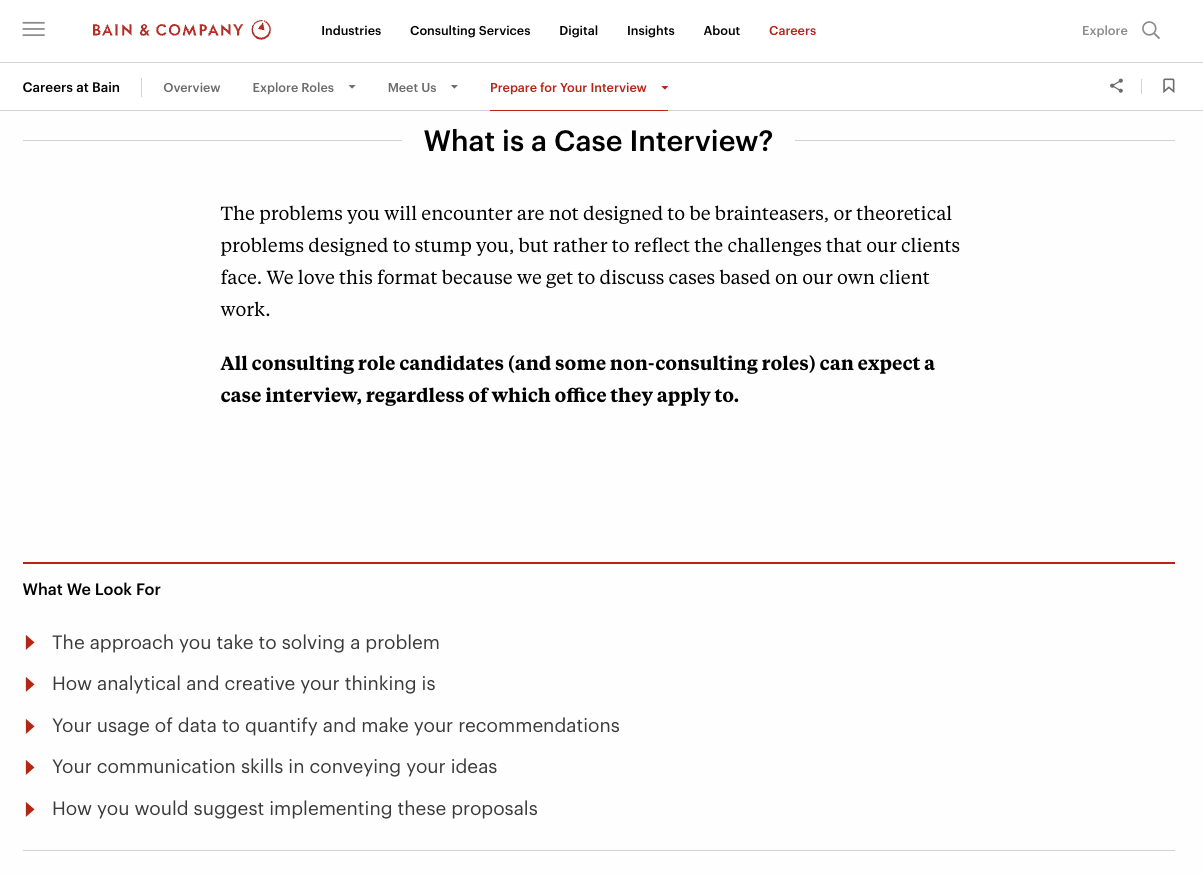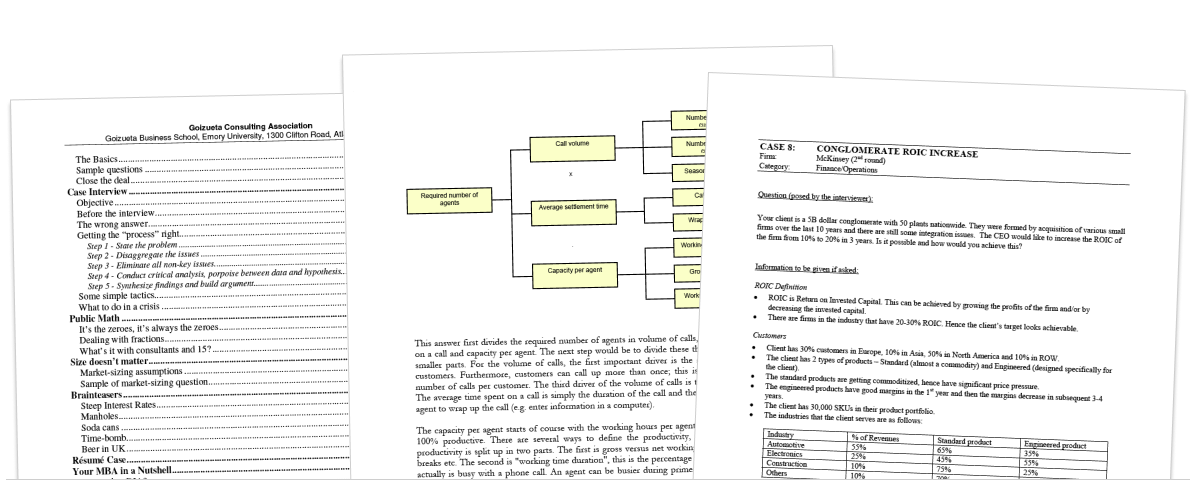Consulting firms use a special type of interview, called a case interview, to test whether candidates have the skills to understand and solve real business problems.
One common example of a case interview question is a market entry question. And this covers both launching new products and entering new geographies, so it’s considered one of the most challenging types of case interview questions.
In this article, we will teach you how to recognize and ace market entry case interview questions. And you can also check out our guide to profitability case interview questions too.
Overview of the market entry framework
What is a case interview framework?
A framework is a template that can be applied to break down and solve case study questions. It aids candidates by giving them a clear approach to resolving the case question they are given.
However, frameworks are just a starting point. They should be customized according to your own thinking and understanding of the case question.

What is the market entry framework?
Market entry framework is a tool to assess and evaluate the viability of entering a new market for a company, this could be the development of a new product or entry into a new geography.
There are 2 main types of market entry cases:
- Geographic Entry: These types of cases ask the candidate to evaluate whether a company should venture into a new geography. For example, standard expansion, joint ventures, mergers, and acquisitions. For example, Lyft might want to venture into Europe or Amazon might want to expand its business into Asia by purchasing a local distributor.
- Product Entry: These types of cases ask the candidate to evaluate whether a company should diversify its product range or launch a new product line. For example, Pepsi Co might be looking to expand into the alcoholic beverages market or Tesla might be looking to expand into the airline industry.
How to apply the market entry framework
There are four steps to apply to the market entry framework in a case interview, including:
- Desirability: Do we want to enter the market?
- Feasibility: Do we have the right people, processes, and technology to enter the market?
- Viability: Can we make the market entry business case work?
- Execution plan: How do we enter the market?
It looks something like this:
Step 1. Assess the target market (desirability)
The first step is to assess if you should be entering the new market. You should ask questions like:
- How big is the revenue opportunity?
- Is the target market growing and how quickly?
- Are there desirable customer demographics in the target market?
- What is the competitive landscape in the target market?
- What stage of the industry lifecycle is the market in?
- What share of the market can we reasonably expect to capture?
Step 2. Evaluate internal capabilities (feasibility)
The second step is understanding whether our company has the internal capabilities to enter the market successfully. You should ask questions like:
- Are our current product offerings / new product offerings suitable for the target market?
- Do we have an appropriate organizational structure and operating model for the target market?
- Do we have sufficiently robust processes to scale up successfully?
Step 3. Analyze investment case (viability)
The third step is determining whether it makes economic sense to enter the new market. You should ask questions like:
- What are the estimated costs and revenue of entering the new market?
- What is the forecast payback period for any investment?
- What is the expected ROI of entering the new market?
- What are the main risks? (e.g. technological, legal, etc)
Step 4. Build an execution plan
Once you have identified and shared key considerations for market entry to your interviewer, they will often ask you how the company should enter the market.
To answer this accurately, you need to build an execution plan.
The execution plan requires you to synthesize all the information you have gathered so far and make recommendations as to how the company should enter the market.
The key questions you should answer in your execution plan include:
- How should you expand into the new market? In the case of a product expansion question, this is build vs partner vs license. And in the case of a geographic expansion question, this is expand organically (greenfield) vs enter a joint venture vs partner vs acquire a competitor.
- What is the timeline? Propose a timeline for entering the market based on the market and competitive dynamics.
Example market entry case interview questions
Example 1: Grocery chain
A grocery chain in New England is considering offering an Internet delivery service (i.e., groceries can be ordered via the Internet and delivered directly to your home). Including the client, there are three main grocery chains in the area. One of them has already entered the Internet market. The only other grocery store currently offering Internet delivery service in the U.S. is a Midwest store.
Should the client enter this market? If so, what issues would they face? If not, how should they protect their market share?
Example 2: Corn feed company
A corn feed company has eight manufacturing plants located in the Midwest. These plants service the entire United States. Their plant in Ohio is in need of refurbishing. The company has four possible options:
- Refurbish the existing plant
- Build a larger plant at the current location
- Build a similar size plant at a new location
- Build a larger plant at a new location
Which is the best option for this plant?
Example 3: Gas manufacturer
Your client is a gas manufacturer. Currently, the client owns and operates its gas plants nationwide. They have hired you to investigate whether they should enter into the business of running 3rd party gas plants. How will you structure the analysis of this case? Should the client enter or not enter into this business?
Example 4: Construction firm
An overseas construction firm wants to expand by establishing a presence in a growing U.S. regional market. What factors should it consider? How should it go about doing this? What factors are critical for its success?
Example 5: Chicken vitamin manufacturer
Your client is a chicken vitamin manufacturer. The vitamin helps increase the size of chicken breasts and reduce fat content. Should they enter China?
Example 6: Travel agent
An Israeli travel agent has been extremely successful. His primary source of revenue is customers who fly to and from the U.S. He manages to fill up over two planeloads on a daily basis. Given his success, he is considering buying an aircraft and flying the U.S.- Tel Aviv route himself. What advice would you give him?
Example 7: Food processing company
You have been hired by a food processing company that recently introduced a new hot dog to the market. Sales in the first two weeks have far exceeded the marketing department’s projections. Your client thinks he may need to add more capacity. What advice would you give him?
Example 9: Airline
A major American airline is considering establishing new routes from Tokyo to several sites in the United States. Would you recommend this action to your client?
